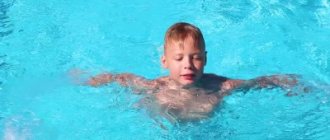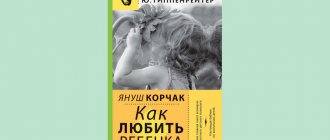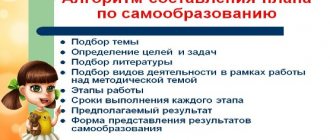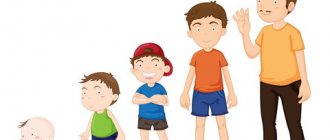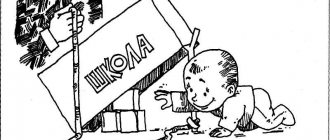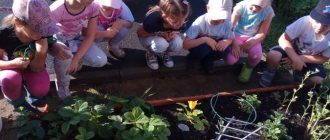The magazine “Preschool Education” is well known to all kindergartens. And it is prestigious to publish material in it.
The journal accepts for publication original, completed scientific and scientific-methodological works of a practice-oriented nature, carried out in the context of current problems in various fields of pedagogy, psychology and related disciplines. The materials provided must reveal various meaningful psychological and pedagogical aspects of the upbringing, development and education of children from 0 to 7 years old; concepts, models, systems for organizing the pedagogical process as a whole or its individual components in the context of preschool education; issues of organization and management of educational institutions at different levels; advanced training of teachers and personnel training.
The article must be written in literary Russian, in a scientific and methodological style, new concepts introduced must have definitions. The material in the article must be systematized, have a clear structure, an evidence base, reveal the problematic nature of the issues covered, and show ways to solve the problem based on the results obtained in the study.
The article must have a practice-oriented orientation, contain materials that allow them to be used in the mass experience of an educational institution, and be accompanied by clarity that reveals the content of the material and confirms the effectiveness of the proposed work. This is especially true for productive activities; articles from work experience. It should be distinguished by novelty, originality, revealing pedagogical creativity and skill of teachers.
Articles must indicate:
- sources (books, manuals, Internet resources, etc.) that formed the basis (used) of the presented material,
- authors whose ideas and books were developed in the proposed publications;
- authors of poems, for songs - authors of music and words.
All articles are reviewed and (or) considered at meetings of the editorial board. The period for reviewing the article is at least three months. No fee is charged from graduate students for the publication of scientific and methodological articles on dissertations. Publication of these articles is royalty-free. The editorial board reserves the right to literary and scientifically edit the content of the article in agreement with the author.
Procedure for submitting materials
An article for the journal is sent to the editorial office by registered mail, by e-mail, or delivered in person.
The article must be submitted by the author in the following package:
- text of the article in Russian and drawings (photos, graphs, tables) on electronic media (floppy disks, CD-ROM, etc.);
- printout of the article with pictures (for archival storage):
The article must be signed by the author.
The period for reviewing materials by the editors is up to three months. After accepting materials for publication, all authors enter into a license agreement with the Publishing House “Education of a Preschooler” in order to comply with copyrights and obligations, both on the part of the publishing house and on the part of the authors. The agreement is sent to the author (team of authors) for signing with a covering letter.
Read more about the rules of publication in the journal “Preschool Education”.
Website of the publishing house “Education of Preschool Children” https://dovosp.ru
Review of periodicals on issues of education and training of young children
Anna Pastor
Review of periodicals on issues of education and training of young children
Today I would like to bring to your attention an overview of periodicals . The purpose of the review : to introduce teachers to the most interesting publications on the issues of education and training of young children , staffing in early age , in various publications.
The relevance of the topic is determined by the current state of practice in raising young children , the reserves of which are often not realized.
Our kindergarten has a subscription to such publications as “ Preschool Educator ”
,
“Handbook for senior
educators ” ,
“Preschool
education ” .
To prepare for the review , I decided to analyze these publications for the period from 2013 to 2021 . In the course of my work, I came to the conclusion that the problem of raising and educating young children is not given enough attention in periodicals. Due to restrictions on subscription journals, I was forced to use the Internet , where I found a fund with archives of other publications, such as “Theory and Practice of Preschool Education”
,
“Preschool Pedagogy”
,
“Modern Preschool Education.
Theory and practice" ,
"Kindergarten from A to Z"
.
However, not all publications were available in electronic versions. I would especially like to recommend the journal “Theory and Practice of Preschool Education”
.
The magazine is addressed to educators , methodologists, specialist teachers and directors of preschool institutions. Despite the frequency of its releases (4 times a year), the publication is very informative and will provide all possible assistance in the work of teachers. As a result of the analysis of scientific and methodological articles, I decided to divide the publications into thematic blocks. And this is what I would like Present to you.
1 block:
Adaptation of young children to kindergarten conditions:
K. Pechora. Problems of adaptation to new living conditions. // Preschool education . 2013.-No. 9.- p. 44.
The article reveals the leading problem - the adaptation of children to new living conditions.
The author defines psychological adaptation as a type of social adaptation and notes the connection between the feeling of attachment to loved ones and the formation of adaptation mechanisms. The article discusses types of attachment. Comparative information is provided based on the results of studies on children’s for preschool education and the outcome of adaptation.
Also given:
• psychological and pedagogical parameters for determining a child’s readiness to transition to new living conditions (from 1 year to 1 year 5 months)
;
• signs of the course of adaptation.
The author gives recommendations for monitoring children during the adaptation period , as well as analyzing adaptation.
V. A. Kulganov. children's adaptation to kindergarten conditions. // Preschool pedagogy. 2015.-No. 4.- p. 4.
The article provides recommendations for preparing a child for admission to a preschool educational institution, including the following activities:
— ensuring the optimal health of the child;
— preliminary vaccination in accordance with the age of the child ;
bringing the home regime as close as possible to the kindergarten regime;
— explanatory work with parents.
The author outlines the main stages of adaptation to new environmental conditions, which determine the severity of the adaptation period and make it possible to outline ways to prevent maladjustment.
Baryshnikova Elena Viktorovna. Studying the psychological adaptation of young children to a preschool educational institution. // Concept. – 2015. – No. 03.
The article is devoted to the study of psychological adaptation of young children to a preschool educational institution. It gives the concept of “psychological adaptation”
, types of adaptation are considered, factors influencing the adaptation
of children to a preschool educational institution are revealed.
2 block:
Health
Esipenko Natalya Sergeevna, Tsudzevich Irina Anatolyevna. The use of small folklore forms for the prevention of psychosomatic diseases in young children . //Theory and practice of preschool education. — 2016.-№ 1.- p. 73.
The article highlights the problem of promoting health and preventing infectious and psychosomatic diseases in young children .
The authors of the article share their experience in using small folklore forms in working with young children as a means of productive work to solve this problem, reveal methods and techniques that are understandable and accessible to children, corresponding to their age characteristics .
The authors pay attention to the therapeutic effects of small folklore forms (supporting the development of children with massage , physical exercise, stimulation of motor reflexes).
Recommendations are given for the compilation of artistic word cards, the selection of story toys, toys and aids combined with speech for the development of motor skills, massage and self-massage of the palms and feet.
3 block:
Interaction with parents
Rykmanova Olga Yurievna. Practice-oriented seminars as one of the forms of interaction between kindergarten and parents of young children . // Theory and practice of preschool education. — 2014.-№ 1.- p. 78.
The author of the article, Olga Yuryevna, an educational psychologist, believes that the lack of knowledge about the psychology of young children filled by conducting practice-oriented training seminars .
The article gives the structure of the seminars, built according to a single scheme: title, goal, tasks, psychological warm-up, theoretical part, practical part, reflection.
The content and some forms of work within these seminars are considered.
4 block:
Content of education and development of preschool children
Balandina Nina Konstantinovna. Features of teaching young children . // Theory and practice of preschool education. — 2021.-No. 2.- p. 45.
This article substantiates the features of teaching young children . Teaching should be based on the zone of proximal development of young children .
The author reveals the content of psychological and pedagogical work with children, based on direct contact with adults and creating conditions for reflecting the knowledge and skills acquired in the classroom in the child’s independent activities.
The article also emphasizes the role of using gaming techniques as a means of increasing children's activity in the classroom .
Belova E. S. Playing activities as a means of developing speech in young children // Modern preschool education. Theory and practice. – 2015. – No. 6. – pp. 32–42.
The work touches upon the problem of children's through play activities. This is due to the fact that the game contributes to the formation of the child’s new formations, his mental processes, including imagination. children's speech is the need for a person to communicate with the people around him.
This work reveals the meaning of games and their role in the development of speech in young children .
The relevance of the work lies in the fact that early age is the period of the most intensive development of the body, the period when the child actively masters spoken language, which is one of the main new formations of the early childhood period . At this time, the formation and development of all aspects of speech occurs: phonetic , lexical, grammatical. Full command of the native language is a necessary condition for solving the problems of mental, aesthetic and moral education of children .
Vasilenko Evgenia Vyacheslavovna. Formation of ideas about set in young children through didactic games.
https://interactive-plus.ru/action/105/action_articles
The article discusses the formation of the concept of quantity in young children . The features of the concept of set, quantity, number and counting by children are described, based on their age . The stages of formation of ideas about set in young children in a preschool institution are revealed; as a result of the work done, a noticeable increase in children's knowledge about quantity .
5 block:
Psychological and pedagogical foundations of preschool education
N. Afonina. Diagnostic study of the cognitive sphere of a young raised in a mixed ethnic family. //Preschool education . – 2015.-No. 1.- P. 90-96.
The article presents a diagnostic technique developed by the author, aimed at identifying the level of development of the cognitive sphere of a young brought up in a mixed ethnic family.
6 block:
Emotional intelligence of teachers of early age
Volik I. G. Problems of emotional sensitivity of teachers of early age . // Preschool teacher . – 2021.-No. 4.- P. 116-119.
In his article, the author proposes to solve the problem of emotional sensitivity of teachers of early age by conducting workshops with training elements.
One of these workshops is shared by educational psychologist I. G. Volik in this article.
N. Motorina. Development of emotional intelligence of teachers of early age groups of preschool educational organizations. // Preschool education . – 2015.- No. 1.- P. 118-122.
The article is devoted to the problem of emotional interaction between a teacher and young children in a preschool educational organization. A conclusion is drawn about the influence of the level of emotional intelligence of the teacher on the well-being of the process of adaptation of a young child to the conditions of a preschool educational institution . The results of a study of emotional intelligence are presented
teachers of early age groups , a program for its development is presented, and practical recommendations are offered.
